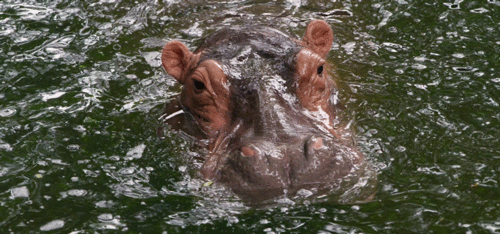
Excrement from hordes of bathing hippos is causing water oxygen levels to plummet, suffocating massive quantities of unlucky fish in Africa’s Mara River. What a horrible way to go!
Because humans are generally to blame for hypoxic (low oxygen) conditions in water bodies, Yale researchers initially believed that pesticides from nearby farms were the cause of the mass fish die-offs observed in East Africa. However, after several years of analyzing water chemistry in the river system, they concluded that hippos were the real culprit.

Decomposing waste from the colossal African herbivores essentially sucks up all of the water’s oxygen and releases harmful ammonium and hydrogen sulfide in the process. Heavy rainstorms then “flush” the oxygen-starved, chemical-laden goop downstream where schools of doomed fish congregate.
Hippos are already well-known for their odd habit of defecating and flinging poop (perhaps as a way to mark their territory):
Apparently, their excessive defecation continues underwater too.
“You can put a net in the water for a few seconds, and the entire middle will just be coated with hippo feces,” study co-author Christopher Dutton told The Atlantic. “[It’s] everywhere. Over the rocks. Over the bottom.”
An estimated 4,000 hippos leave behind over 9 metric tons of dung and urine every single day as they bask in the Mara’s shallow pools. You can’t really blame them — they spend most of the day submerged in these small pools in order to keep cool and prevent sunburn in the oppressive African heat.
While disgusting, this is likely not cause for concern (for us, at least).
“Frequent hypoxia may be a natural part of tropical river ecosystem function, particularly in rivers impacted by large wildlife,” the researchers wrote in the published paper.
Even so, we wouldn’t wish that death on any creature.
Interested in learning more? You can find the full research article here.
WATCH NEXT: Hippo vs. Earth’s Greatest Predators
Watch what happens when the hippo crosses paths with some of Africa’s fiercest predators:




